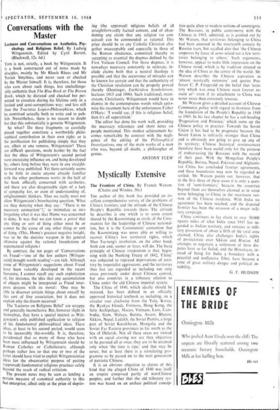Conversations with the Master
Lectures and Conversations on Aesthetics, Psy- chology and Religious Belief. By Ludwig Wittgenstein. Edited by Cyril Barrett. (Blackwell, 12s. 6d.)
THIS is not, strictly, a book by Wittgenstein. It is a book constructed out of notes made by disciples, mainly by Mr Rhush Rhees and Mr Yorick Smythies, and never seen or checked by the Master himself. It is, therefore, for those who care about such things, less unchallenge- ably authentic than The Blue Book or The Brown Book, which he dictated and checked but per- mitted to circulate during his lifetime only in a limited and semi-surreptitious way; and less still than the Tractatus Logico-Philosophicus, which he contrived actually both to write and to pub- lish. Nevertheless, there is no reason to doubt but that this substantially is genuine Wittgenstein.
So what? Do these fragments so carefully pieced together constitute a worthwhile philo- sophical contribution in their own right; or is the justification for publishing simply that they are, albeit at one remove, Wittgenstein? These are difficult questions, made harder by the fact that the ideas of Wittgenstein's second period were exercising influence on, and being developed by, others long before they were in any straight- forward way published. Yet there certainly seems to be little to excite anyone already familiar with the other posthumous works in the half of the book officially concerned with aesthetics, and there are also disagreeable signs of a lack of sympathy for, or even of understanding of, enlightenment thinkers. Thus we really must not allow Wittgenstein's browbeating question, 'What are they denying when they say : "There is no necessary connection"?,' to intimidate us into forgetting what it was that Hume was concerned to deny. It was that we can know a priori that any thing or sort of thing either must be or cannot be the cause of any other thing or sort of thing. (This, Hume's greatest negative insight, was to be the decisive weapon in his general offensive against the rational foundations of supernatural religion.)
By contrast, the ten pages of `Conversations on Freud'—`one of the few authors [Wittgen- stein] thought worth reading'—are rich. Although some of Wittgenstein's suggestions about Freud have been valuably developed in the recent literature, I cannot recall any such exploitation of, for instance, the idea that any accumulation of objects might be interpreted as Freud inter- prets dreams with its moral: 'One may be able to discover certain things about oneself by this sort of free association, but it does not explain why the dream occurred.'
The 'Lectures on Religious Belief' are scrappy and generally inconclusive. But, however slight in themselves, they have a special interest as Witt- genstein's only published application to religion of his fundamental philosophical ideas. These ideas, at least in his second period, would seem to be inexorably this-worldly. It is, therefore, paradoxical that so many of those who have been most influenced by Wittgenstein should be Roman Catholics or Catholicisers; although perhaps rather less so that one or two of the latter should have tried to exploit Wittgensteinian ideas for the obscurantist purpose of putting (approved) fundamental religious practices safely beyond the reach of radical criticism.
The present notes may be seen as lending a certain measure of canonical authority to this last enterprise; albeit only at the price of depriv- ing (the approved) religious beliefs of all straightforwardly factual content, and of aban- doning any claim that any religion (so con- ceived) can be commended as rational. This price should be to any Catholic Christian alto- gether unacceptable and especially to those of the Roman obedience, committed thereby to accepting as essential the dogmas defined by the First Vatican Council. For those dogmas, it is nowadays necessary constantly to reiterate, in- clude claims both that a natural theology is possible and that the occurrence of miracles can be known for certain and that the authenticity of the Christian revelation can be properly proved thereby (Denzinger, Enchiridion Symboloruni, Sections 1813 and 1806). Such traditional, main- stream, Christianity Wittgenstein would have to dismiss in the contemptuous words which epito- mise his treatment here of the unfortunate Father O'Hara: 'I would say, if this is religious belief, then it's all superstition.'
The editor has done his work well, providing the necessary references and short notes on people mentioned. This modest achievement be- comes remarkable by contrast with the negli- gence of the editing of the Philosophical Investigations, one of the main works of a man who was, beyond all doubt, a philosopher of genius.
ANTONY FLEW


































 Previous page
Previous page